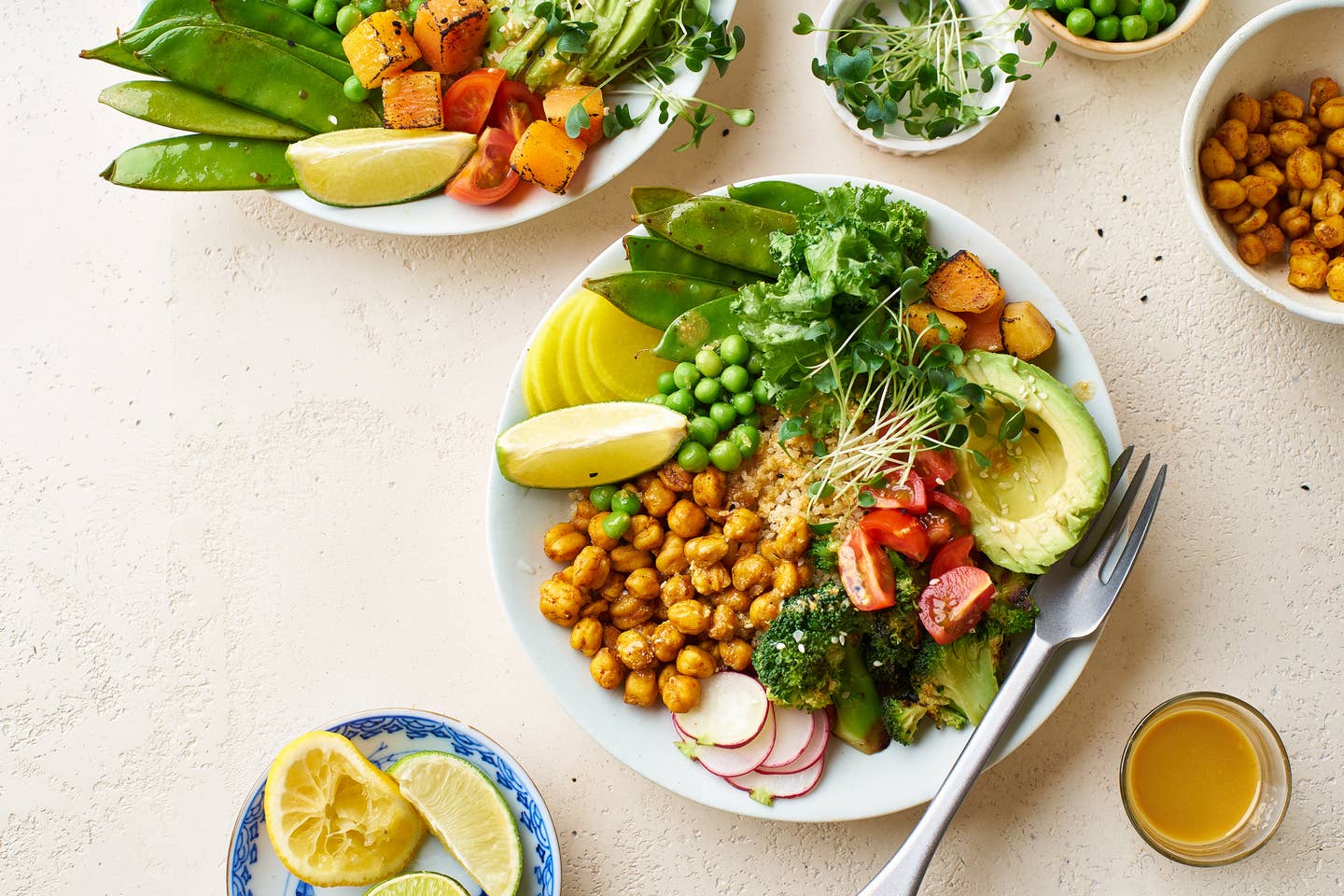
Your Guide to Picking the Best Vegan Protein Powder, and 10 We Tested
Whether you’re looking for a portable post-workout recovery drink, or just want to add a bit more protein to your daily meal plan, vegan and plant-based protein powders can help get the job done with minimal effort. But even in the plant-based world, the number of options can be overwhelming. Finding one that is right for you depends on your taste, budget, and preference for ingredients. We’ve got the low-down on vegan protein powders, so you can spend less time in the store and more time sweating.
When Do I Need a Plant-Based Protein Powder?
Spoiler Alert: You don’t! Incorporating vegan protein powder into your diet is more of a want than a need situation. And while plant-based protein powders aren’t necessary for everyone, they can be helpful in certain situations. For example, plant-based athletes who are training for an event like a marathon or triathlon might find it difficult to get enough protein from food alone.
How Active Are You? Anyone training hard for an event, or to build lean muscle and get stronger may be benefited by using a protein powder, especially as a recovery drink. To help with muscle building and repair (one of the main roles protein plays in the body), athletes need about 0.5 to 1.0 grams of protein per pound of bodyweight. For a 150-pound athlete, that’s anywhere from 75 to 150 grams of protein per day, which can be difficult to get from plant-based foods alone. Even meat-eating athletes who want to add more protein to their diet may benefit from choosing to supplement with a vegan protein powder when it comes to repairing, maintaining, and building muscle.
The Main Types of Plant-Based Protein Powders
The most widely available protein powders are made from either whey or casein, both of which come from dairy. But luckily for plant-based eaters, there are now many other vegan options available to choose from.
Soy Protein Powder
It probably comes as no surprise that soy is the base for many plant-based protein powders. Made from soy protein isolates, soy protein powder has much of the fat and carbs removed, leaving about 90–95% protein. Although the protein count varies between brands, most soy protein powders have about 20 grams per serving. Soy is also a complete protein, meaning that it contains all the essential amino acids that the body cannot make but needs when it comes to protecting your muscle tissue. This is a rarity among plant-based proteins, and many athletes may choose to use soy protein powder when training for this reason alone.
Pea Protein Powder
A very popular protein in the plant-based space comes from the yellow split pea, a legume that is high in all but one of the essential amino acids. Many plant-based athletes opt for pea protein powders because they are also particularly high in what’s called branched-chain amino acids (BCAAs), which promotes muscle protein synthesis (the act of protein repairing muscle damage caused by intense exercise) and minimizes muscle degradation. Pea protein powder usually contains about 15 grams of protein per serving, and research suggests it delivers similar muscle benefits to whey protein.
Brown Rice Protein Powder
For those with soy allergies or people who experience stomach issues when eating pea protein, brown rice is another type of plant-based protein powder. With about 4-6 grams of protein per scoop, it’s not as high in protein as other plant-based options. Brown rice protein isn’t particularly high in BCAAs either, but its main benefit is that it’s easy on the stomach, making it a more sensitive solution for athletes with tummy troubles (something you definitely don’t want to deal with in the middle of a run or swim!).
Mixed Protein Powders
Many vegan protein powders are a mixture of different plant-based proteins, such as brown rice, pea, hemp, chia seeds, flax seeds, and quinoa. Combining varieties of protein creates a powder that has all the essential amino acids and plenty of protein to boot.
What to Look for on the Label
You know the varieties of plant-based protein powder, but how do you pick among the many brands on the shelves? Here are a few things to look for on the label, regardless of what type of plant-based protein powder you go with.
Check the Ingredients
Don’t assume that just because you’re buying plant-based protein powder, every other ingredient is in its purest form. Before you buy it turn the bottle over and look at the ingredients listed. Many protein powders have additives, including artificial sweeteners, natural zero-calorie sweeteners, or other flavorings. There’s nothing “wrong” with these ingredients, but they can often taste funky and may even cause gas and bloating. Opt for unsweetened powder and sweeten them up yourself. For example, use unsweetened protein powder in pancake mixes, baked goods, or smoothies.
Read the Nutrition Label
This may sound obvious but check out the label for the protein facts. Yes, they all contain protein but not all protein powders are made the same way (particularly in the case of a mixed protein powder versus a single form like pea or soy), so protein stats will differ between brands. Some also have things like those BCAAs, omega-3s, and probiotics added to the mix. Determine whether or not these are beneficial to your training and choose accordingly.
Make Sure It’s Third Party Tested
Since protein powders aren’t regulated by the Food and Drug Administration (FDA), they should be tested by a third party. The most reputable is the NSF International (National Sanitation Foundation) Certified for Sport seal, which means the product contains only what’s found on the label, it has been tested for contaminants, and it has been made at a facility that is frequently tested for safety and quality.
Your Guide to The Best Plant-Based Protein Powders: We Tasted 10 Bestsellers
1. Vega Protein & Greens
The base of Vega is pea protein, brown rice protein, and sacha inchi (a seed eaten like a nut) protein. One serving of Vega has only 80 calories and 15g of protein. Vega's protein powder is a great choice for anyone who struggles to get enough greens in their diet. The proteins are combined with alfalfa powder, spinach powder, broccoli powder, and organic kale powder giving you 2 servings of veggies in one scoop. The taste of this protein was described as "artificial" whereas others thought it tasted like birthday cake. We recommend adding this into a smoothie, but luckily all you have to add is fruit since Vega has the greens covered. This low-cal powder won't break the bank at $1.20 a scoop.
2. TB12 Vanilla Plant-Based Protein
Tom Brady's TB12 pea protein powder consists of simple ingredients with no additives. For anyone who is allergic to soy or nuts, TB12's pea protein-based powder is a great option. It's hard to say no to this powder with 24 grams of protein. Don't hide this powder in a smoothie, mix it with water and you will immediately see a thick consistency resembling a vanilla milkshake. Not only does it look like a milkshake, but it tastes like it too. TB12 recommends drinking this powder up to 20 minutes after a workout for the best recovery. You have to order this powder on the TB12 website since it isn't available in stores or on Amazon. Less than $2 per serving!
3. PlantFusion Complete Protein
PlantFusion is a blend of peas, artichokes, algae, and superfoods. The deep yellow-gold coloring of PlantFusion's protein powder set this brand apart from the rest. Some testers found the flavor wasn't overwhelming, making it a great addition to a smoothie, whereas others felt the powder was sweet. For those of you who aren't a fan of Stevia, buy the natural, no-stevia blend. This protein powder is low in fat, and carbs, making it a great choice for anyone wanting to lose weight while still getting enough protein (21g a serving). PlantFusion's powder has a sweetness not everyone enjoyed since Stevia is an ingredient. $1.20 a scoop, makes this a deal!
4.Vivo Perform
Vivo Perform is the most superfood-packed protein powder of this bunch. Athletes will appreciate this protein powder made of pea protein, hemp protein, plant-based BCAA (branched-chain amino acids), reishi mushrooms, acai berries, lucuma fruit powder, maca powder, and turmeric extract. Vivo Perform is $59 on Amazon so go straight to their website for a cheaper price at $51 for the pouch pictured below. With 25g of protein and complete amino acid profile helps athletes to build, perform, recover, and absorb. If you want a quick protein drink after a workout, use a shaker bottle when mixing or this powder will stick to the sides of the cup. In the mood for a protein-filled breakfast? Add to your oatmeal or smoothie bowl with this recipe.
5. Elevate Plant-Based Performance Protein
Elevate is a pea and hemp protein-based powder that also is made with sweet potato powder. For anyone looking to convert from whey protein powders, Elevate is the plant-based protein for you. This powder is meant to be used in beverages such as smoothies. The thin consistency doesn't mix well with water and becomes chalky. If you aren't in the mood for a protein smoothie, add a scoop to your pancake batter. For a complete recipe check out Elevate's Chocolate Chip Banana Protein Pancakes. This powder is another affordable choice at $1.60 a scoop.
6. Momentous Absolute Zero
Momentous protein powder is a combination of pea and rice protein concentrate. Testers liked the initial scent of mint and thought it was refreshing. This powder is perfect for anyone who likes sweeter drinks. Momentous powders are NSF International Certified for Sport, which means the product label is 100% accurate and there are no banned substances present in this powder. This is one of the pricier protein powders at $60 a tub but is worth it for athletes looking for a clean and effective post-workout powder. We recommend either mixing with water or adding to a smoothie for a more nutrient-dense drink. The priciest powder of the bunch at $3 per serving.
7. Garden of Life
Garden of Life is made of pea, buckwheat, amaranth sprout, and brown rice. We didn't love the green color of the powder or the way it smelled but once we mixed it with water, it tasted surprisingly good. Garden of Life is the easiest to mix with water, plan-based milk or in a smoothie. The vanilla flavor isn't overpowering so you can add this to any combination of smoothies and not be overwhelmed by the taste of vanilla. And it's only $1.20 per scoop!
8. Tone It Up Plant-Based Protein Vanilla
Tone It Up protein powder is a blend of sunflower seeds and pea protein. The minute we opened the container, everyone loved the smell of this powder. Tone It Up is known to be a great addition to baked goods. The next time you make your protein muffins, add Tone It Up to the mix. We don't suggest adding this powder with just water but instead a smoothie with fruits and veggies.
9. Nuzest Clean Lean Protein
The name of this powder says it all. Nuzest is the cleanest protein powder since it is made out of only 3 simple ingredients: Pea protein isolate, natural vanilla flavor, and thaumatin (a low-calorie sweetener). For $45, you are supposed to get 20 servings out of one container, but at a glance that didn't seem accurate. This high protein, low carb powder is perfect to blend with plant-based milk and ice. The consistency is smooth and adds thickness to any protein shake.
10. Snap Plant Protein with Nitric Oxide Booster
Snap is soy-free, gluten free and free of all the usual chalky taste that other protein powders often have. The folks at Snap assume that athletes are control freaks, and want to be over informed about what they put into their bodies, so the container is a veritable biochemistry lesson in amino acids, with a complete profile of the drink as well as the nutrition facts. If you want the short playing version know this: 1 scoop contains only 1 gram of carbs, 101 calories and 2 grams of fat, and still delivers all your 9 essential aminos plus 9 others for good measure, and a Nitric Oxide booster to help deliver more oxygen to your vitals. The vanilla flavor is perfect on its own or in a smoothie: Add berries, oat milk, and a spoonful of almond butter for your perfect post-sweat-session recovery drink. Then get ready to crush it again the next time, because you’ll “snap back” faster thanks to your secret weapon: Snap.
More From The Beet






